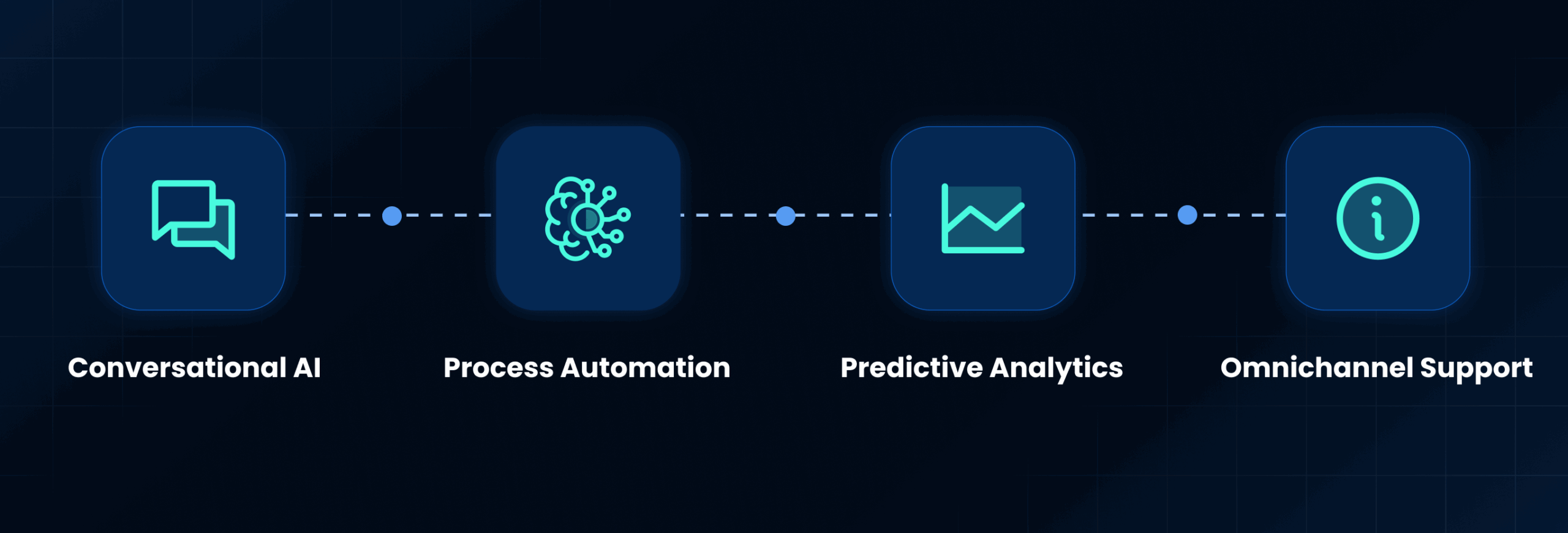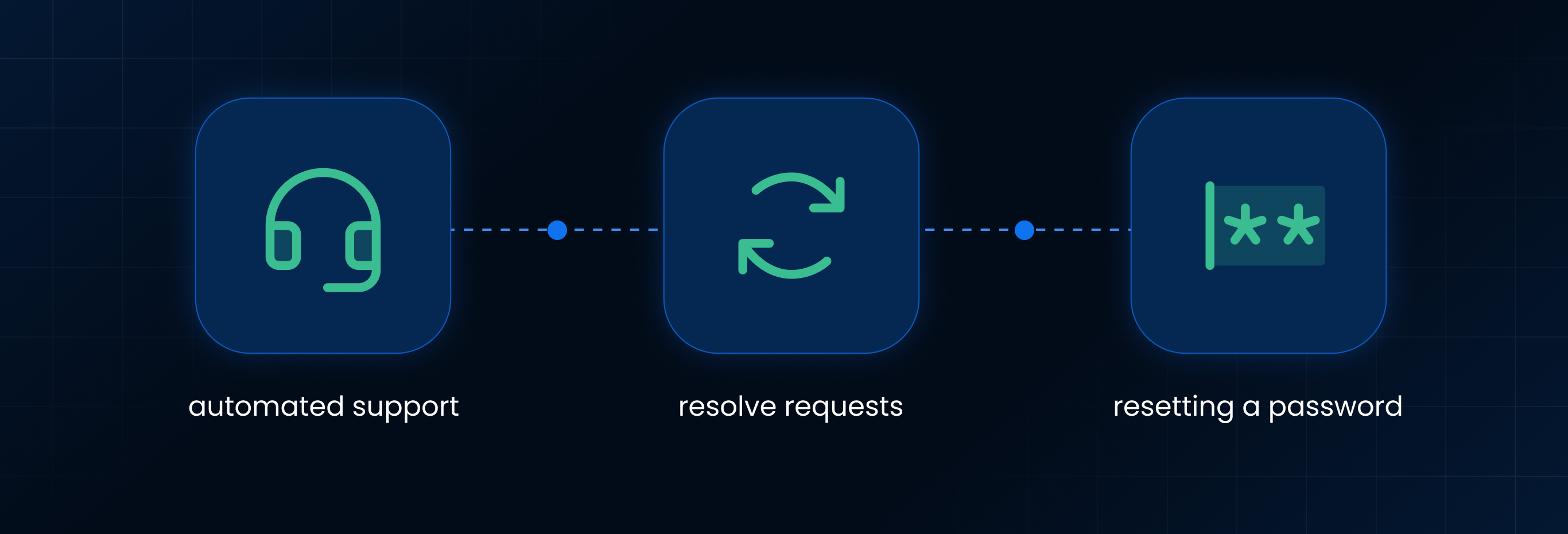Introduction
As a technology leader, you face constant pressure. You need to boost efficiency, improve the employee experience, and drive strategic growth, all while managing ever-expanding IT and operational backlogs. Your teams are likely swamped with repetitive support tickets, pulling them away from high-impact projects. This is where a modern virtual agent becomes not just a tool, but a strategic partner. It’s time to move past the old idea of clunky chatbots and embrace an AI that works as a skilled, autonomous member of your team.
This guide will walk you through everything you need to know about the virtual agent of today. We will cover what it is, how it delivers tangible value, and why it is an essential part of any forward-thinking enterprise strategy. We will explore how this technology can free up your best people to do their best work.
The Modern Enterprise Virtual Agent Explained
Thinking about a virtual agent simply as a chatbot is like comparing a seasoned specialist doctor to a waiting room receptionist. While both interact with people, their capabilities are worlds apart. The modern virtual agent is a sophisticated AI designed to understand, act, and resolve complex issues within your enterprise ecosystem.
A virtual agent is an advanced software application powered by artificial intelligence that provides automated support to users. It goes far beyond scripted answers. Instead, it engages in natural, human-like conversations to understand a user’s intent. Then, it integrates with your core business systems to perform tasks and resolve requests from start to finish. Think of it as a digital employee who can independently handle a wide range of tasks, from resetting a password to provisioning new software or checking the status of a financial invoice. This capability makes it a powerful asset for any organization.
How Does a Virtual Agent Actually Work?
The magic behind a virtual agent is not really magic at all. It is a powerful combination of several cutting-edge technologies working together seamlessly. Understanding this process helps clarify how it delivers such significant results for your teams.
How Does a Virtual Agent Work?
At its core, a virtual agent operates on a three-step process: understand, connect, and act. First, it uses Natural Language Processing (NLP) to understand what a user is asking, no matter how they phrase it. It grasps the context and intent behind the words. Next, it connects securely to your enterprise systems, such as your ticketing platform, HR information system, or financial software, through APIs. Finally, based on the user’s request, it acts. This could mean finding information, executing a workflow, or updating a record in another system. Consequently, the virtual agent resolves the issue without needing to escalate to a human.
Comparing a Virtual Agent to Other AI Tools
The AI landscape is filled with terms that can seem confusingly similar. However, distinguishing between a chatbot, a virtual assistant, and a virtual agent is crucial for making the right strategic investment for your company.
Virtual Agent vs. Chatbot (and Virtual Assistant)
A chatbot is the simplest of the three. It typically follows a predefined script or decision tree. If you ask a question outside its script, it often fails. A virtual assistant, like Siri or Alexa, is more advanced and designed to help individuals with personal tasks like setting reminders or playing music.
A virtual agent, on the other hand, is built for the enterprise. It has the conversational ability of a virtual assistant but is designed to perform complex business-specific functions. It does not just answer questions; it resolves multi-step problems by integrating with the very systems your business runs on. This makes the virtual agent a true problem-solver within your organization.
Core Capabilities of a Modern Virtual Agent
To truly appreciate its power, you need to understand the key capabilities that set a modern virtual agent apart. These features are what enable it to function as an autonomous digital colleague, ready to support your employees.
Key Capabilities of Virtual Agents

A state-of-the-art virtual agent possesses several core abilities. It features advanced Conversational AI that allows for natural, back-and-forth dialogue. Furthermore, it excels at Process Automation, autonomously executing workflows across multiple applications. A virtual agent also offers Predictive Analytics, identifying potential issues before they impact employees. Finally, it provides Omnichannel Support, meeting your employees on the platforms they already use every day, such as Slack, Microsoft Teams, or a web portal.
The Strategic Benefits of an Enterprise Virtual Agent
Implementing a virtual agent is not just about closing tickets faster. It is about generating clear, measurable business value that resonates all the way up to the executive board. These benefits impact your bottom line and your company culture.
Benefits of Virtual Agents for Enterprises
The strategic advantages are significant. First, you will see a dramatic Reduction in Operational Costs by automating routine tasks and deflecting a high volume of tickets from your human support teams. Second, a virtual agent drastically Improves Employee Experience by providing instant, 24/7 support, eliminating frustrating wait times. Third, it Increases Operational Efficiency, as your skilled IT and HR professionals are freed up to focus on strategic initiatives instead of repetitive queries. Lastly, a virtual agent provides Effortless Scalability, easily handling fluctuations in support demand without requiring additional staff.
Putting Your Virtual Agent to Work
The true value of a virtual agent is realized when it is applied to real-world business challenges. Its versatility allows it to add value across multiple departments, streamlining operations far beyond the traditional IT help desk.
Common Use Cases of Virtual Agents
Across the enterprise, a virtual agent can handle a wide variety of tasks. In IT, common use cases include automated password resets, unlocking accounts, troubleshooting application issues, and managing software access requests. In HR, it can answer questions about benefits, process paid time off requests, and help with employee onboarding. For Finance, a virtual agent can provide updates on expense report status, clarify procurement policies, and answer questions about invoices. Each use case removes a burden from your support teams.
Integrating Your Virtual Agent into Your Ecosystem
A virtual agent does not operate in a vacuum. Its effectiveness is directly tied to how well it connects with the tools and platforms your company already uses. Seamless integration is a non-negotiable requirement for success.
Integration and Channel Support for Virtual Agents
An effective virtual agent must offer robust, pre-built integrations with major enterprise systems like ServiceNow, Workday, Salesforce, and Oracle. This ensures it can pull information and execute tasks within the systems you rely on. In addition, it must be available on the channels where your employees already work. Whether it is Microsoft Teams, Slack, or a mobile app, the virtual agent should provide a consistent and accessible experience, making it incredibly easy for employees to get the help they need, whenever they need it.
How Leena AI’s Virtual Agent is Redefining the Possible
At Leena AI, we believe the future of enterprise support is not just about assistance; it is about autonomy. We are pioneering the next evolution of the virtual agent with our Agentic AI platform, creating a digital workforce that does more than just answer questions, it takes action.
How Leena AI Enhances Virtual Agent Functionality
Our virtual agent is designed to function as an autonomous agent that can reason, plan, and execute complex workflows. For example, instead of just telling an employee how to get access to a new software tool, our virtual agent can check for license availability, get necessary approvals, and provision the software directly to the employee’s machine. It can proactively detect network issues and create a ticket on behalf of an entire office before employees even notice a problem. This shift from a reactive support model to a proactive, resolution-oriented one is what sets Leena AI apart and moves your organization toward a “Zero-Ticket” future.
Your Next Step Toward a More Efficient Future
The evidence is clear: a virtual agent is no longer a futuristic concept but a present-day necessity for any large enterprise looking to optimize its operations and empower its workforce. It is a powerful engine for efficiency, a catalyst for a better employee experience, and a strategic asset that delivers a clear and compelling return on investment.
Ready to see how an Agentic AI-powered virtual agent can transform your enterprise? Leena AI is here to help you begin your journey.
Frequently Asked Questions about the Virtual Agent
How long does it take to implement a virtual agent?
With modern platforms like Leena AI, implementation is faster than you might think. Thanks to pre-built integrations and use cases, a powerful virtual agent can be up and running in a matter of weeks, not months.
Is a virtual agent secure enough for enterprise use?
Absolutely. Enterprise-grade virtual agents are built with security at their core. They use robust encryption, comply with standards like SOC 2 and GDPR, and integrate securely with your company’s authentication systems to ensure data is always protected.
Can a virtual agent handle truly complex, multi-step queries?
Yes. This is a key differentiator of a modern virtual agent. It can handle conversations that require it to remember context, ask clarifying questions, and interact with multiple backend systems to fully resolve a complex request.
How does a virtual agent learn and improve over time?
A great virtual agent uses machine learning to improve with every interaction. It analyzes conversation data to understand which answers are most helpful and identifies gaps in its knowledge base, allowing it to become smarter and more effective over time.
What kind of ROI can we expect from a virtual agent?
The return on investment is significant and multifaceted. It includes hard savings from reduced ticket volume and operational costs, as well as soft benefits like increased employee productivity and satisfaction, which directly impact retention and innovation. Most enterprises see a positive ROI within the first year.














